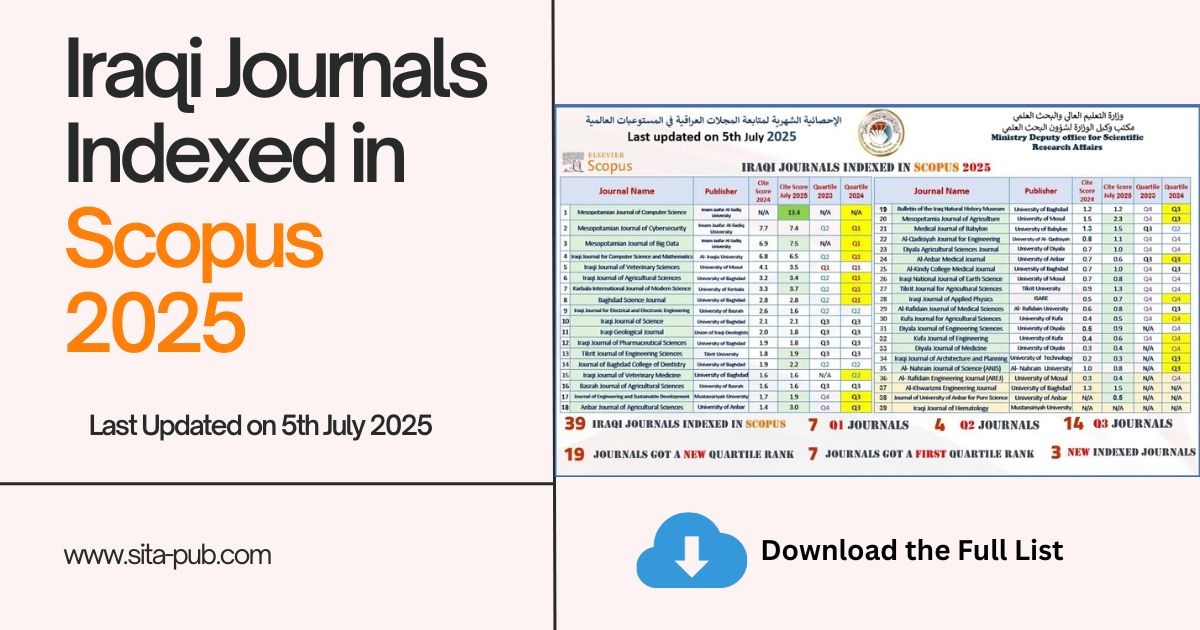Latest Iraqi Journals Indexed in Scopus 2025


Iraq's academic research landscape is steadily growing, with numerous journals gaining international recognition through indexing in prestigious databases like Scopus. Being indexed in Scopus not only enhances the visibility and credibility of these journals but also helps researchers worldwide access quality scientific work from Iraq. This article provides a comprehensive list of Iraqi journals indexed in Scopus as of 2025, highlighting their CiteScore and quartile rankings. Whether you are a researcher looking to publish or someone interested in Iraqi scholarly contributions, this guide will help you understand the importance of these metrics and how to use them effectively.
# | Journal Name | Publisher | CiteScore 2024 | CiteScore July 2025 | Quartile 2023 | Quartile 2024 |
1 | Mesopotamian Journal of Computer Science | Imam Jaafar Al-Sadiq Univ. | N/A | 13.4 | N/A | N/A |
2 | Mesopotamian Journal of Cybersecurity | Imam Jaafar Al-Sadiq Univ. | 7.4 | 7.4 | Q1 | Q1 |
3 | Mesopotamian Journal of Big Data | Imam Jaafar Al-Sadiq Univ. | 7.5 | N/A | Q1 | Q1 |
4 | Iraqi Journal for Computer Science and Mathematics | Al-Iraqia University | 6.8 | 6.5 | Q1 | Q1 |
5 | Iraqi Journal of Veterinary Sciences | University of Mosul | 4.2 | 4.1 | Q2 | Q2 |
6 | Iraqi Journal of Agricultural Sciences | University of Baghdad | 3.6 | 3.1 | Q3 | Q2 |
7 | Karbala International Journal of Modern Science | University of Karbala | 3.5 | 3.2 | Q2 | Q2 |
8 | Baghdad Science Journal | University of Baghdad | 2.8 | 2.6 | Q3 | Q3 |
9 | Iraqi Journal for Electrical and Electronic Engineering | University of Basrah | 2.1 | 2.1 | Q3 | Q3 |
10 | Iraqi Journal of Science | University of Baghdad | 1.9 | 2.0 | Q3 | Q3 |
11 | Iraqi Geological Journal | Union of Iraqi Geologists | 1.8 | 1.8 | Q3 | Q3 |
12 | Iraqi Journal of Pharmaceutical Sciences | University of Baghdad | 1.2 | 1.6 | Q4 | Q3 |
13 | Tikrit Journal of Engineering Sciences | Tikrit University | 1.5 | 1.5 | Q4 | Q3 |
14 | Journal of Baghdad College of Dentistry | University of Baghdad | 1.4 | 1.3 | Q4 | Q3 |
15 | Iraqi Journal of Veterinary Medicine | University of Baghdad | 1.2 | 1.2 | Q4 | Q3 |
16 | Basrah Journal of Agricultural Sciences | University of Basrah | 1.6 | 1.2 | Q4 | Q3 |
17 | Journal of Engineering and Sustainable Development | Mustansiriyah University | 1.9 | 1.0 | Q3 | Q4 |
18 | Anbar Journal of Agricultural Sciences | University of Anbar | 1.4 | N/A | Q4 | Q3 |
19 | Bulletin of the Iraq Natural History Museum | University of Baghdad | 1.2 | 1.2 | Q4 | Q3 |
20 | Mesopotamia Journal of Agriculture | University of Mosul | 1.5 | 2.3 | Q4 | Q3 |
21 | Medical Journal of Babylon | University of Babylon | 1.3 | 1.5 | Q4 | Q3 |
22 | Al-Qadisiyah Journal for Engineering | University of Al-Qadisiyah | 0.8 | 1.1 | Q4 | Q3 |
23 | Diyala Agricultural Sciences Journal | University of Diyala | 1.0 | 1.0 | Q4 | Q3 |
24 | Al-Anbar Medical Journal | University of Anbar | 1.0 | 1.0 | Q4 | Q3 |
25 | Al-Kindy College Medical Journal | University of Baghdad | 0.8 | 1.0 | Q4 | Q3 |
26 | Iraqi National Journal of Earth Sciences | University of Mosul | N/A | N/A | N/A | Q4 |
27 | Tikrit Journal for Agricultural Sciences | Tikrit University | N/A | N/A | N/A | Q4 |
28 | Iraqi Journal of Applied Physics | ISARE | N/A | N/A | N/A | Q4 |
29 | Al-Rafidain Journal of Medical Sciences | Al-Rafidain University | 0.6 | 0.9 | Q4 | Q4 |
30 | Kufa Journal for Agricultural Sciences | University of Kufa | 0.5 | 0.9 | Q4 | Q4 |
31 | Kufa Journal of Engineering Sciences | University of Kufa | 0.5 | 0.9 | Q4 | Q4 |
32 | Diyala Journal of Engineering Sciences | University of Diyala | 0.8 | 0.8 | Q4 | Q4 |
33 | Iraqi Journal of Architecture and Planning | University of Baghdad | 0.7 | 0.7 | Q4 | Q4 |
34 | Al-Nahrain Journal of Science (ANJS) | Al-Nahrain University | N/A | N/A | N/A | Q4 |
35 | Al-Rafidain Engineering Journal | University of Mosul | N/A | N/A | N/A | Q4 |
36 | Al-Khwarizmi Engineering Journal | University of Baghdad | N/A | N/A | N/A | Q4 |
37 | Al-Shuhama Engineering Journal | University of Baghdad | 1.3 | 1.5 | N/A | N/A |
38 | University of Anbar for Pure Science | University of Anbar | N/A | N/A | N/A | Q4 |
39 | Iraqi Journal of Hematology | Mustansiriyah University | N/A | N/A | N/A | Q4 |
You can also download the complete list of Iraqi Journals Indexed in Scopus 2025 in a structured format for offline viewing or academic reference.
When choosing a journal to publish your research, it’s essential to understand how journals are ranked and measured. One of the most common and trusted metrics is CiteScore, provided by Elsevier’s Scopus database. But what exactly is CiteScore, and why does it matter?
CiteScore is a metric that shows the average number of citations received per article published in a journal. It is calculated based on a four-year window: the total number of citations received in one year is divided by the number of documents published in the previous three years. For example, the CiteScore for 2024 is based on citations received in 2024 for articles published in 2021, 2022, and 2023.
Here’s a simple example:
If a journal published 100 papers in 2021–2023 and those papers received 500 citations in 2024,
The CiteScore for 2024 would be 500 / 100 = 5.0
CiteScore is important because it gives researchers a quick and reliable way to assess the impact and relevance of a journal. Journals with higher CiteScores are often seen as more reputable and influential in their field.
For researchers, choosing a journal with a high CiteScore may mean:
Greater visibility for your work
A better chance of your research being read and cited
Improved academic reputation, especially in promotion or funding applications
For institutions, CiteScores help track the performance and prestige of their published work.
However, it's also important to remember that a high CiteScore doesn’t always mean a journal is the best fit. Other factors like peer review quality, editorial board, open access policy, and scope should also be considered.
In addition to CiteScore, quartile rankings offer another way to judge the quality of a journal. These rankings divide journals into four groups (Q1, Q2, Q3, and Q4) within their subject area, based on their CiteScore.
Here’s what each quartile means:
Q1 (Top 25%): These are the top-performing journals in a field. Publishing in Q1 journals is considered prestigious.
Q2 (25–50%): These are still strong journals with good visibility.
Q3 (50–75%): These journals are solid but less competitive.
Q4 (Bottom 25%): These are the lowest-ranked journals in terms of CiteScore, but they can still be valuable for early-career researchers or specific topics.
To find a journal’s quartile ranking:
Visit the Scopus website (https://www.scopus.com).
Go to the “Sources” section.
Search for the journal name.
You will see its CiteScore, subject area, and quartile ranking.
You can also use tools like:
Scimago Journal Rank (SJR): https://www.scimagojr.com
Journal metrics tools in academic databases like Elsevier, Clarivate, or Google Scholar.
Knowing a journal’s quartile helps researchers aim higher and submit their work to the most impactful journals. If your research is strong and ready, targeting Q1 or Q2 journals can improve your academic reputation and the reach of your work.
Publishing in Scopus-indexed journals is a key step for researchers to advance their careers. It requires precise writing, selecting the right journal, expert translation (if needed), and careful follow-up during the review process.
At SITA Academy, our experienced team guides you through every step—from journal selection and manuscript preparation to handling reviewer feedback—to boost your chances of acceptance.

Send Your Paper Abstract |

Receive Journal List |

Select Your Journal |

Start the Publication Process |
Why Choose SITA Academy?

Team of human professionals

Quality Assurance

Timely delivery

Satisfaction guarantee